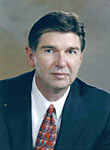Q&A With Chuck O'Dell: Making a Difference Among Chief Executives

For many business leaders, becoming chief executive of a $4.5 billion company might be the capstone of a career. For Chuck O'Dell, it has turned out to be just a stepping stone. After serving as CEO of Sodexho Marriott Services, Inc., one of the world's largest food and facilities management companies, O'Dell decided to make a career change and become an advisor to CEOs. For the past several years, O'Dell has served both on the board of directors and as a consultant to a number of small, entrepreneurial companies. This month, he joins WJM Associates as president and chief operating officer. In addition to providing strategic leadership, he will work alongside Chairman Bill Morin and Vice Chairman John Finnerty as an advisor to senior executives.
Q. What is the most difficult thing about being a chief executive?
CEOs have very few people with whom they can discuss issues and concerns openly, even to the point of revealing their uncertainty. That's very hard to do with members of your senior management team or board. Just about everyone in an organization has an agenda, intentional or unintentional. And even if they don't, they haven't been in your position, so any discussion about what they might do is pure theory.
It's also difficult to discuss possibilities before they become realities. For example, it's hard to talk to your head of operations about an operations issue when you're just trying to wrestle with it, before you've had a chance to develop a perspective on the matter. Uncertainty threatens people.
Q. So you're saying you can't let anybody think you're indecisive or weak.
That's correct. It's very hard to have that freedom to be real in the discussion, both on the part of the people who report to the CEO and on the part of the CEO. The CEO has the challenge of trying to deal with the board and with direct reports. There's no one in the organization the CEO can confide in and feel that "This person understands what I'm up against and what I'm trying to accomplish."
Q. What was the most significant issue you faced as CEO?
From a strategic standpoint, how to raise the skill level of 100,000 people. Managing human capital is the CEO's greatest responsibility -- and also the greatest challenge.
Q. We've seen many companies go through massive layoffs these past few years. What issues will CEOs have to address when the economy rebounds?
CEOs will need to rebuild trust within their organizations, which downsizing can damage significantly. Downsizing can be appropriate at certain times, but CEOs have to realize that it does not come without a cost. Then, as the organization begins to pull out of its trough and begin a growth cycle again, it is absolutely essential that the CEO rebuild that communication link with all levels of the organization. Only with trust and open communication can the CEO determine the needs of the company and begin to rebuild the peoples' and organization's skills.
Q. What are you looking forward to most in your new position?
I want to make a difference in the professional lives of executives who run companies of major divisions or major organizations in the United States. I've been the CEO of a major company. I've spent a lot of time over the past few years advising CEOs of smaller companies in how to run their businesses, how to deal with their human resource challenges and other strategic issues. I realized that the best way to make a difference in a lot of companies and to a lot of CEOs was to join a company like WJM Associates. I think it's a good fit for us both.
Join our newsletter
Stay up to date on all things happening at WJM Associates



